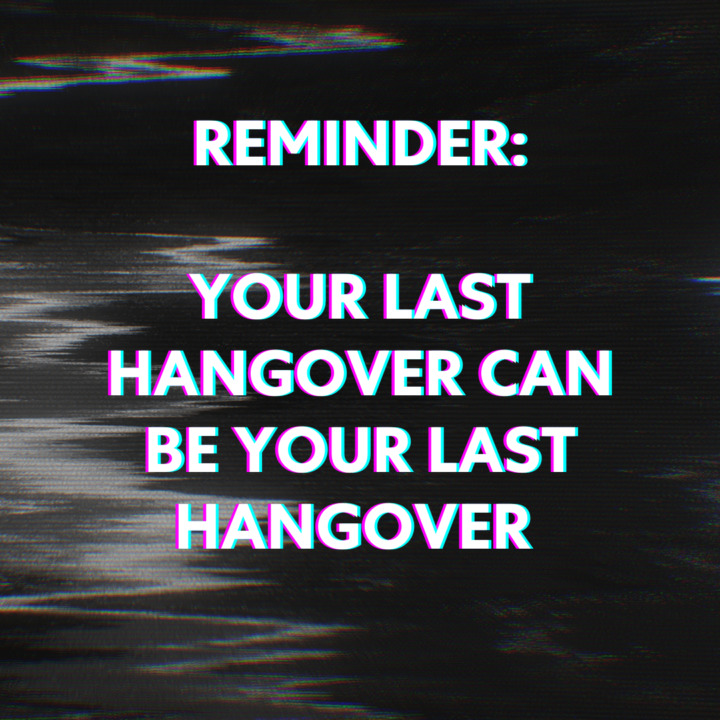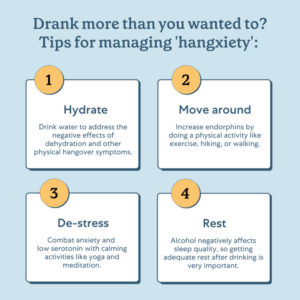Most adults in America are familiar with the sensation of a hangover. In fact, one report claims that more than 70 percent of Americans have had at least one in their life. But, even though hangovers are very common, many people don’t understand how they actually work. Learning more about what happens to our bodies after drinking large quantities of alcohol can provide a helpful new perspective.
Let’s dive in to hangover causes, relief, and prevention.
What is a Hangover?
A hangover is a general term to describe the mental and physical effects brought on after consuming alcohol. The main cause behind hangovers is ethanol, which is the primary toxin responsible for why alcohol makes you drunk. Ethanol travels throughout the body through the bloodstream, leading to many uncomfortable symptoms. Hangovers look different for everyone, and no two are the same. For example, you might have a pounding head and dry mouth when you wake up after a night consuming alcohol. However, your friend’s symptoms might be primarily gastrointestinal in nature, where even looking at food could be nauseating.
Symptoms of a Hangover
As mentioned above, hangover symptoms may vary from person to person. The same person may also have dramatically different symptoms each time they excessively drink alcohol. However, there are some common patterns to what a hangover might feel like. Some of these symptoms include:
- Dizziness: It might feel like the floor is tilting or the room is spinning around you
- Sore muscles and fatigue: Some people describe this as feeling as if they had just run a marathon
- Gastrointestinal distress: This can take the form of nausea, as well as vomiting and diarrhea
- Excessive thirst: Dehydration can cause symptoms like thirst and dry mouth
- Pounding headaches: These headaches can be made even worse with light exposure
- Anxiety: As alcohol “wears off” it can cause anxiety to spike, also known as hangxiety
Each of the symptoms highlighted above can vary in intensity and duration. If you find yourself suffering from any of these symptoms frequently, that may be a sign that you could benefit from taking a closer look at your relationship with alcohol.

Factors that Increase Severity
You’re probably wondering why some people experience certain symptoms and why the intensity of those symptoms differs. In reality, there are many factors involved that contribute to hangover severity. Those factors include:
Your Genetics
Some people are simply better able to effectively metabolize alcohol than others. This is often because of genetics. One interesting study noted that almost half of all the variations in hangover frequency and severity could be genetically linked. This is partly why some individuals’ bodies are naturally more successful at breaking down ethanol, preventing more intense symptoms. Other people may not be as effective at processing and breaking down alcohol and, thus, may suffer from worse hangovers. The exact mechanism for this genetic susceptibility is still being investigated.
Your Mood
It’s believed that your mood before you start drinking can also determine how intense your hangover is. For example, if you’re angry or upset when you start drinking, you may be more likely to experience a hangover. This is because your mood can affect the enzymes in your stomach that are responsible for processing alcohol.⁵ It’s also common for feelings of anxiety, stress, or anger to increase while recovering from a heavy drinking session. This is because your brain’s “happiness chemicals” can become depleted once the initial effects of alcohol wear off. Also, perhaps more surprisingly, hangovers can also lead to an increase in risky, thrill-seeking behavior. Researchers believe this because many people have reduced executive functioning after drinking heavily, which influences their decision making.
Other Drug Use
Mixing drugs and alcohol can make a hangover substantially worse. This is because other drugs introduce additional toxins that can worsen dehydration, increase inflammation, and further slow down the body’s process for regaining its natural homeostasis. However, it’s not just illicit drugs that you need to be careful with. A wide range of prescription medications can also combine poorly with alcohol, making your hangover worse. Always consult with your physician to understand possible drug interactions and follow prescription guidelines to ensure your safety.

Your Hydration
Another factor that can impact hangover symptoms is how hydrated or dehydrated you are while drinking. Often, when people are out for a night on the town, they forget to drink water. This is especially problematic because alcohol is a diuretic, making you need to urinate more. As a result, it can increase your level of dehydration. If you are dehydrated, symptoms of a hangover, like fatigue and headaches, are likely to be dramatically worse.
Congeners
“Congeners” is a technical term for the other chemical substances that get produced during the alcohol fermentation and distillation process besides ethanol. Congeners are what give alcohol products their distinct taste. Methanol and tannins are two common examples. Drinks with higher congener-content are typically dark liquors, and these beverages are more likely to cause severe hangovers. For example, a rum and coke is likely to cause a more intense symptoms than a vodka tonic of equal alcohol content.
How Much Alcohol Can Cause a Hangover?
Unfortunately, this is a question that does not have a simple answer. The most accurate answer is: it depends. Technically, any amount of alcohol, even a single glass of wine, could cause a hangover if your body struggles to process it effectively.
That said, most people are unlikely to experience negative affects after just a glass of wine or a drink or two, especially if they remember to eat and stay hydrated while drinking. More alcohol usually leads to a stronger hangover. One common suggestion is to not drink more than one drink per hour to avoid symptoms. This is because the liver is only able to process approximately one drink per hour.
When Do Symptoms Start? How Long Do They Last?
Generally, you don’t experience the symptoms of a hangover while you’re drinking. There’s a time lag between stopping drinking and experiencing symptoms, but the length of this gap is not an exact science. However, most estimates suggest that hangover symptoms start to appear three to four hours after consuming alcohol. This is because you generally don’t start seeing symptoms until your blood alcohol level reaches zero, which usually happens roughly in this timeframe.
Unfortunately, hangover symptoms don’t always resolve quickly. Many people experience symptoms for approximately 14 hours, and are able to sleep through the majority of this duration. While for other people, symptoms can linger for up to 24 hours or even longer. The psychological impacts, such as guilt, shame, and anxiety, can also last beyond the physical symptoms.
How to Find Relief from a Hangover
After a night of drinking, you wake up in the morning and find yourself with a throbbing headache. You stand up from your bed to make your way to the kitchen for a glass of water and some aspirin, and you realize that your room is spinning around you. Then your stomach starts to turn. Sound familiar? If you find yourself in this unpleasant situation, there are some things you can do to get relief.

Rehydrate Yourself
The number one recommendation for getting relief is to boost your hydration. Drink as much water as necessary. Broth, as well as juices, can be another great way to add hydration. However, make sure to avoid caffeine. Caffeine can make some of your hangover symptoms, like a racing heart rate and a sense of anxiety, even worse.
Eat Something
It can be helpful to get food into your stomach, even if you feel nauseous. It’s probably best to avoid anything spicy and stick with simple comfort foods instead. When you are deciding on what to eat, focus on carbohydrates and protein. For example, you could try toast and scrambled eggs.
Rest and De-stress
If your head is really throbbing or you experience significant muscle and joint pain, then napping or resting could help lessen some of your symptoms. Aspirin or other NSAIDs may also be helpful, if safe and appropriate. It’s important to note that you should never mix Tylenol with alcohol. You might also try natural pain remedies and stress-relieving activities like meditation or walking to boost your serotonin and dopamine levels (your ‘happiness hormones’).
How to Prevent a Hangover
The tips offered above are great for addressing hangovers, but it’s even better to avoid experiencing a one in the first place.
The good news is that there are proactive steps that you can take to prevent a hangover. Below, we highlight five of these steps:
- Practice moderation when drinking. If you do choose to drink, try not to drink more than one drink every hour and regularly assess how you feel while you are drinking. When you’re making this assessment, remember that it takes a while for the alcohol that you’re drinking to affect you. Here are some therapist tips for how to drink in moderation.
- Choose your drinks wisely. Hangovers are generally less severe when drinking clear liquid rather than dark or heavy liquors.
- Hydrate, hydrate, and then hydrate some more. The better hydrated you are, the less severe your symptoms may be. One great way to remember to hydrate is to always finish a glass of water before you have another drink.
- Eat while you drink. Your chances of developing a wicked hangover go down if you’re drinking on a full stomach since food will soak up some of the alcohol.
- Check on your mood. If you check your mood and notice that you are feeling stressed, anxious, or depressed, be extra careful about your alcohol consumption. These emotions can become exacerbated by alcohol and make you feel even worse after you stop drinking.
Don’t Hesitate to Reach Out for Help
Many people aren’t sure if their alcohol use has become unhealthy. This phenomenon is sometimes called “gray area drinking“. If you find yourself having consistently painful hangovers, that’s a strong indication you would benefit from taking a closer look at your relationship with alcohol. At Monument, we offer personalized help for building a healthier relationship with alcohol. You can talk to a physician about your symptoms and treatment options, like medication to curb cravings. You can also explore virtual alcohol therapy, where you get matched with a therapist specialized in helping people change their drinking habits. Remember, your last hangover can truly be your last. And there’s support to help you get there.
Sources:
- YouGov. “Drinking ‘Heavyweights’ Suffer More from Hangovers, https://today.yougov.com/topics/lifestyle/articles-reports/2015/06/15/heavyweights-suffer-more-hangovers.” Accessed May. 3, 2022.
- Society For The Study of Addiction. “Genetic Influences on Alcohol-Related Hangover, https://onlinelibrary.wiley.com/doi/abs/10.1111/add.12699.” Accessed May. 3, 2022.
- Journal of Clinical Medicine “The Effects of Alcohol Hangover on Mood and Performance Assessed at Home, https://www.ncbi.nlm.nih.gov/pmc/articles/PMC7231019/.” Accessed May. 3, 2022.
- Discover Magazine “Why Don’t Some People Seem to Get Hangovers?, https://www.discovermagazine.com/health/why-dont-some-people-seem-to-get-hangovers.” Accessed May. 3, 2022.
- Pub, Open Access. “The Duration of the Alcohol Hangover Alcohol Hangover Duration, https://openaccesspub.org/jadr/article/690.” Accessed May. 3, 2022.
- NPR. “Want to Avoid a Hangover? Science Has Got You Covered, https://www.npr.org/sections/thesalt/2015/12/31/461594898/want-to-avoid-a-hangover-science-has-got-you-covered.” Accessed May. 3, 2022.
